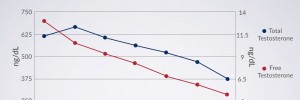The male aging process is associated with a significant number of bodily changes and health-related problems. Detecting and treating these changes/problems at an earlier stage can considerably increase the chances of a positive outcome to these changes/problems. Select a specific issue below to learn more about that issue, how to detect that issue, and how… Read more
Articles on Aging & Bodily Changes
Testosterone Levels By Age

Testosterone is the prototypical male hormone. It’s what puts hair on your chest and muscles on your frame during puberty. Put simply, testosterone is what makes a man a man. In healthy men, normal testosterone levels generally range between 300 ng/dL and 1050 ng/dL. Unfortunately, levels decline with aging and may fall below the normal… Read more
Sleep and Aging
Men are often unclear about the relationship between sleep and aging. Most men commonly think that the older they get the less sleep they need. On the contrary, sleep need does not decrease with age. However, sleep and aging are related in that sleep quality and quantity do tend to decrease with age. As a… Read more
Changes in Body Composition with Aging
As a man ages, he loses muscle mass, typically about 0.5- 1.0% per year after the age of 40.1 These loses may seem very small, but by the age of 50 these losses add up to roughly a 5-10% loss in muscle mass. Additionally, this loss in muscle mass is typically accompanied by an increase… Read more
Reproductive and Sexual Function and Aging
Reproductive and urinary problems increase in prevalence with aging. With the length of life expectancy in the US, most men will probably be affected by such a problem during their lifetime. The most common reproductive and urinary problems include prostate cancer, benign prostate hyperplasia, erectile dysfunction, ejaculatory disorders, and urinary incontinence. While many men find… Read more
Growth Hormone and Aging
Our bodies secrete growth hormone (GH) at their highest levels during puberty. However, beginning in early adulthood (20s), GH secretion decreases at an average rate of about 15% per decade.1,2 As a result, by late adulthood total GH secretion is typically less than half of total GH secretion in early adulthood.3 In some cases, GH… Read more
DHEA - Dehydroepiandrosterone
Dehydroepiandrosterone (DHEA) is easily one of the most popular supplements in the US. Its popularity stems from claims that supplementation with DHEA slows down aging, increases energy, increases muscular strength, boosts immunity, and decreases body weight. Below is an overview of DHEA and what science and the medical community actually knows about its supplementation. Read… Read more
FSH - Follicle Stimulating Hormone
Follicle stimulating hormone (FSH) is a hormone secreted by the anterior pituitary gland (a small endocrine gland in the base of the brain). Once secreted in men, it stimulates the testes to produce testosterone and sperm. Thus, FSH plays a vital role in the hormonal status and reproductive ability of men. Abnormal levels (levels that… Read more
LH - Luteinizing Hormone
Luteinizing Hormone (LH) is a hormone secreted by the anterior pituitary gland (a small endocrine gland in the base of the brain). Once secreted in men, it stimulates the testes to produce testosterone, which acts as the primary male hormone and is essential for the production of sperm.1 Similar to follicle stimulating hormone (FSH), which… Read more
Presbyopia: Vision and Aging
Unfortunately, as we age, our ability to focus at near distances decreases. This condition is known as presbyopia (literally translated as trying to see as old men do). It is inevitable, normal part of the aging process, and, although it may be hard to accept, it is something that you can be aware of and… Read more